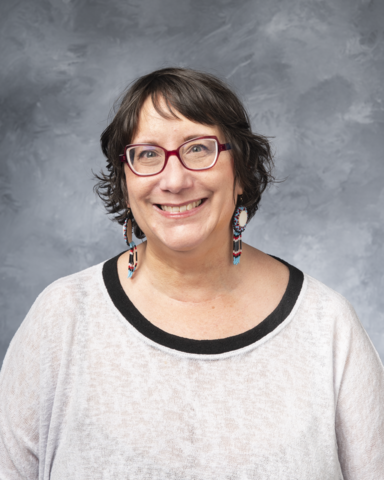By: Emily Delgado
Amy Korthank, senior associate director of academic support in the College of Liberal Arts and Sciences, received the Mental Health Champion Award from the Scanlan Center for School Mental Health.

The award celebrates efforts and commitment to supporting mental health. This is the second year of this award, and it aims to elevate those who are working to develop mental health resources for students across the University of Iowa.
“I was very surprised to hear I had been honored with this award,” Korthank said. “I do feel that there are so many people who deserve this award just as much or more than I do. I think every person in our office deserves this award along with me.”
Korthank has been with the university for 25 years and has worked in many roles across the university providing support to students.
Cornelia Lang, associate dean for undergraduate education in CLAS, said Korthank serves as a role model for students in the way she prioritizes her own mental health and self-care.
“She goes above and beyond her role of academic support to ensure that students who are struggling with mental health challenges are provided with the resources they need,” Lang said in Korthank’s nomination for the Mental Health Champion Award.
Korthank’s job in the undergraduate programs office requires her to come up with ways to best serve CLAS students. The office helps guide undergraduates through their academic journey, is a resource to solve problems, and connects students with services available across campus—a large part of their work addressing mental wellbeing.
“We deal with students who are just stressed to those who need immediate mental health help, every single day,” Korthank explained.
When Korthank meets with students she makes sure she is advising them on academic troubles but also seeing how she can assist in making sure students are taking care of themselves.
In her role, Korthank is working on developing more awareness about the mental health resources available across campus.
“It is so hard for students and faculty to know where to turn, and I hope my work helps be one of those caring hands that can guide people to who can help best,” Korthank said.
Korthank helped create the CLAS Undergraduate Student Academic Concern form. This form allows faculty to notify the college of students who may be having issues in the classroom, such as, not attending class or responding to outreach. Hopefully to help those students come up with solutions before they severely impact their academics. This then can help remove barriers and burdens from those seeking mental health resources by providing students personalized connections.
Korthank emphasized that it is important for CLAS and the university to prioritize mental health and keep developing resources.
“Your health and mental health are the most important things, everything else can be figured out, and there are people that will help and support you no matter what is going on,” Korthank said.